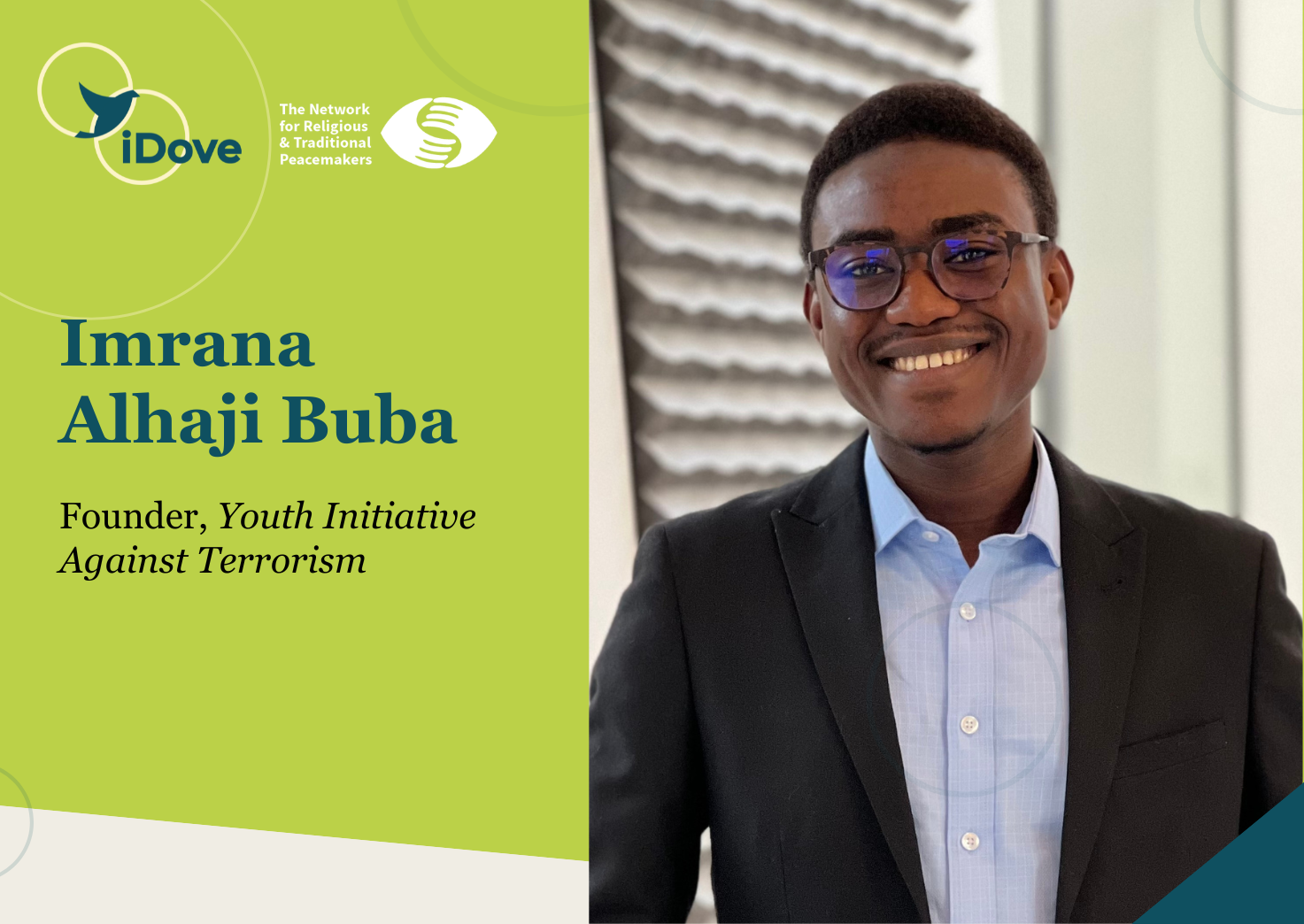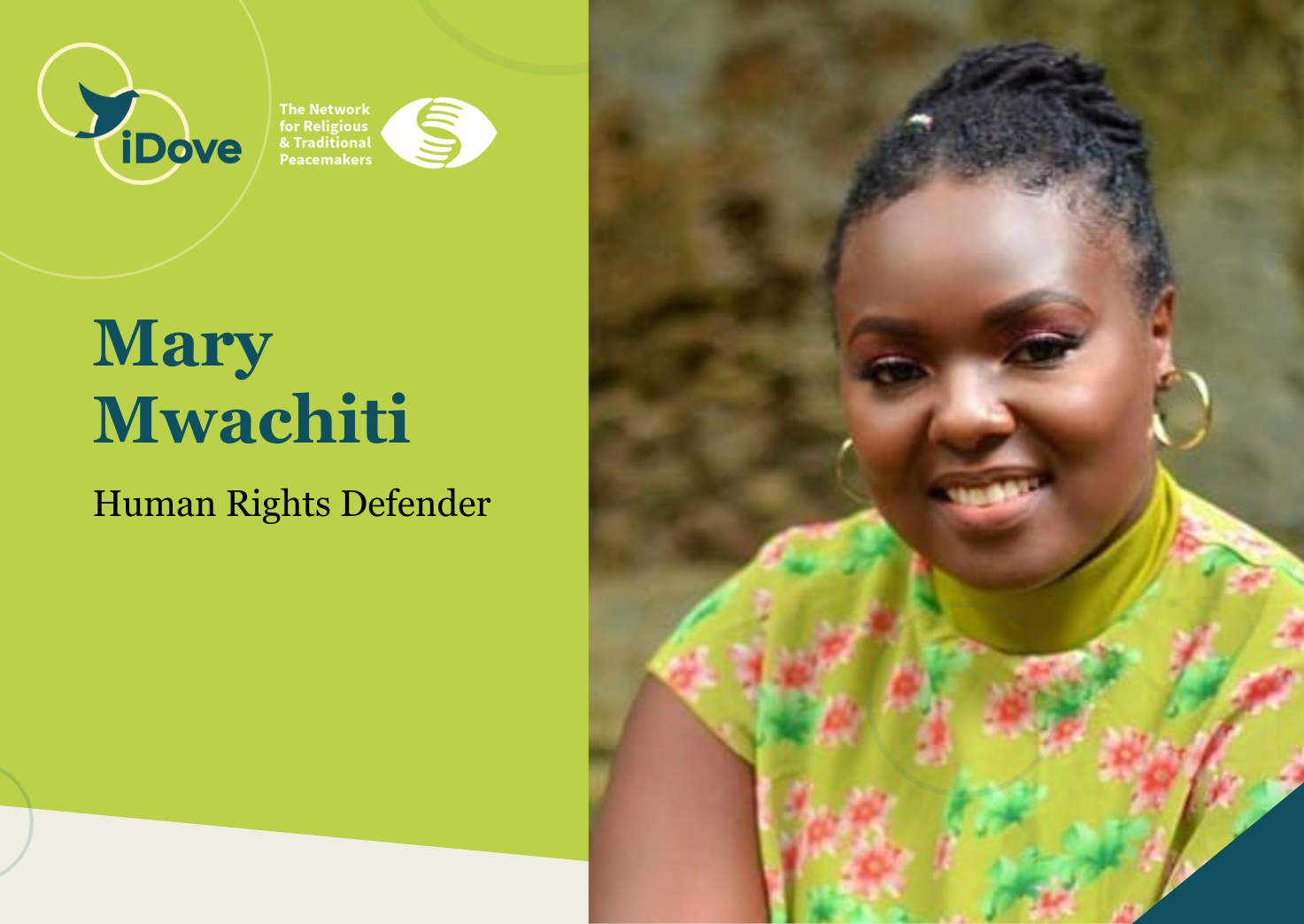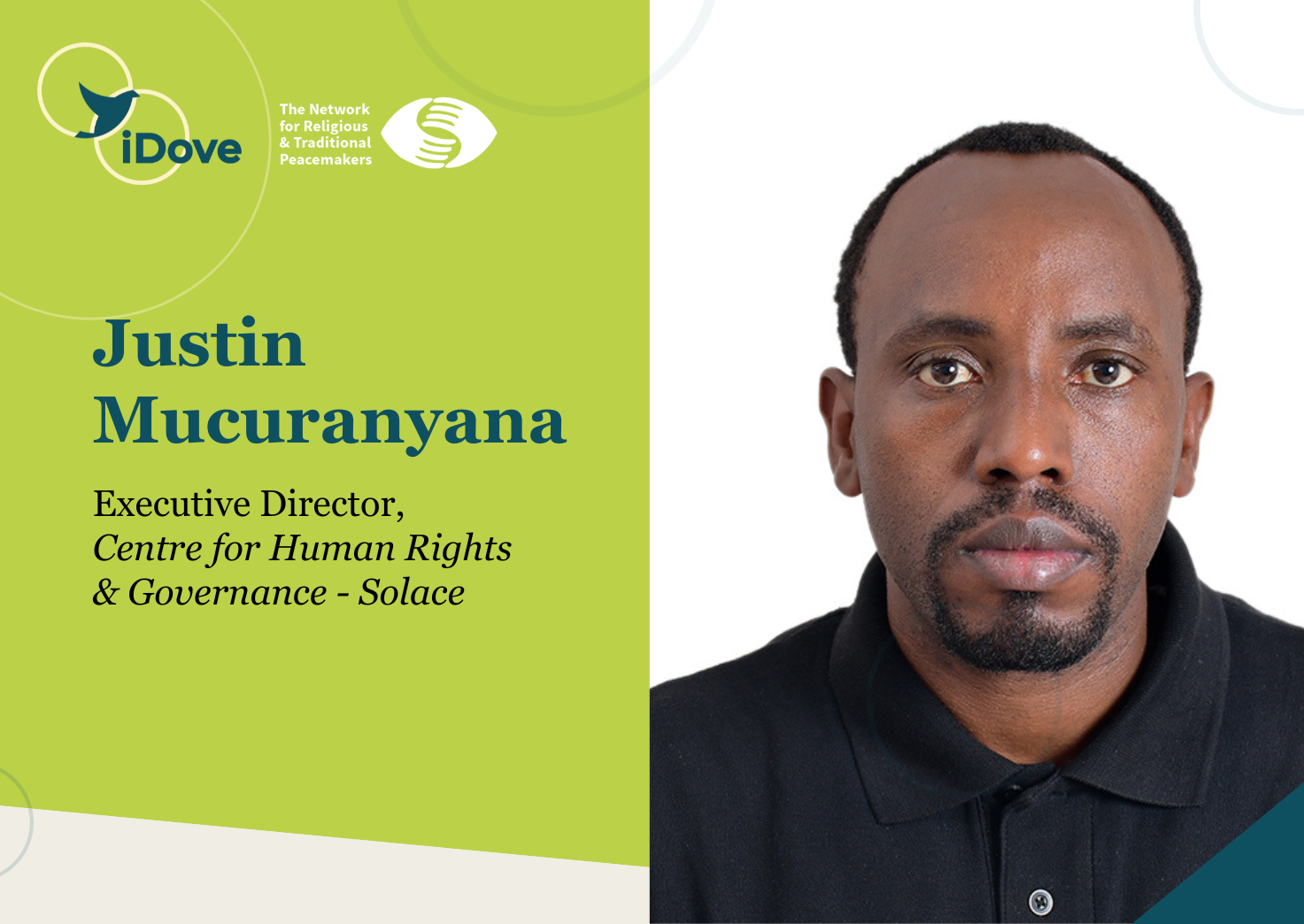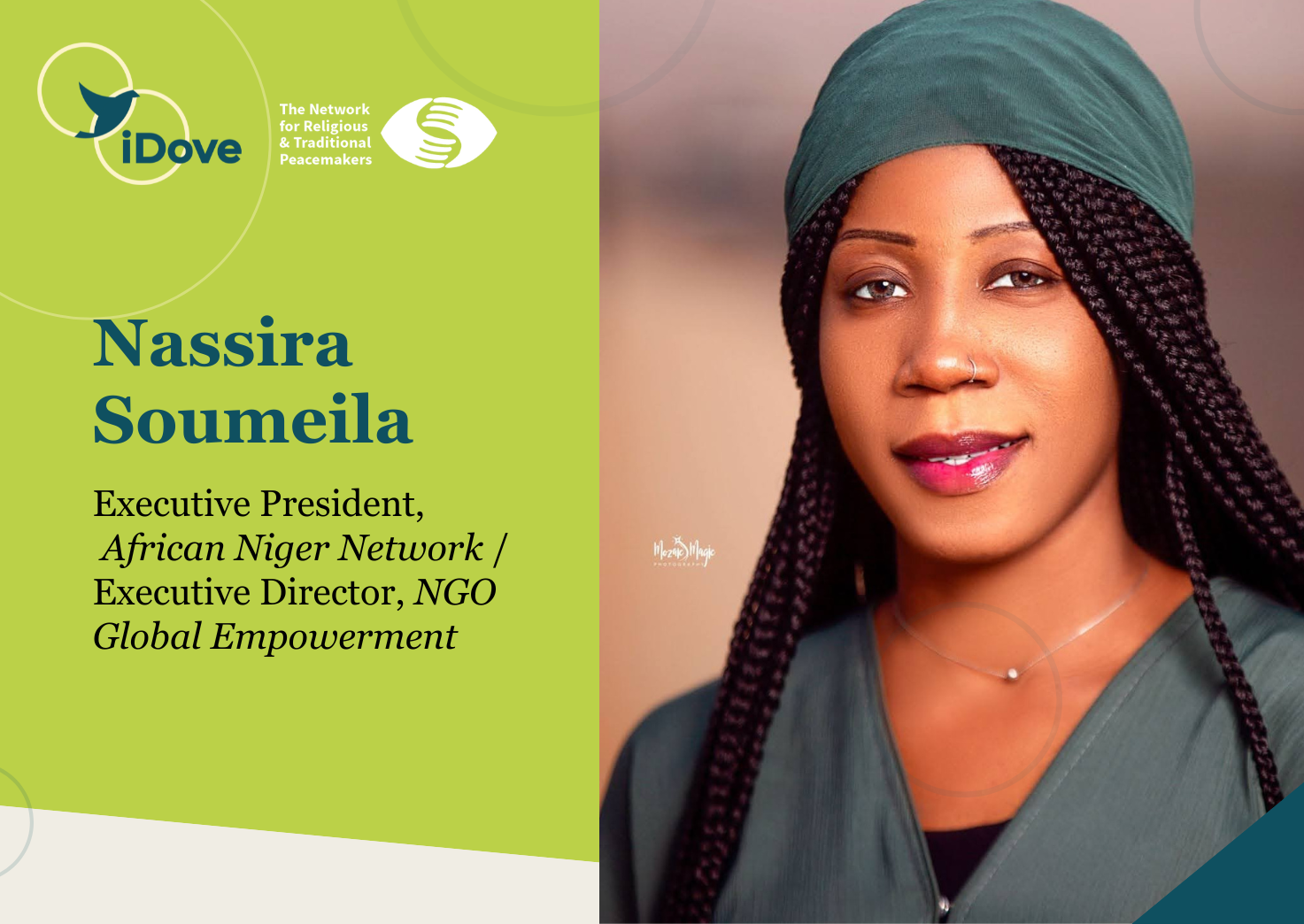Advancing a Gender Transformative Approach to P/CVE: iDove Youth Programme Findings
Webinar | September 2024
On Thursday, September 19, the Peacemakers Network held an event with four youth speakers from the Interfaith Dialogue on Violent Extremism (iDove) programme, who have implemented small-grant projects focused on gender and radicalization in preventing violent extremism over the past year. iDove was jointly launched by the African Union Commission (AUC) through the Citizens and Diaspora Directorate (CIDO) and the Deutsche Gesellschaft für Internationale Zusammenarbeit (GIZ) GmbH, commissioned by the German Federal Ministry for Economic Cooperation and Development (BMZ) in February 2017. Since its inception, the programme has been able to establish a network of young peacemakers from all around the world, working on preventing and countering violent extremism (P/CVE). Watch the recording here to see the full conversation.
The Peacemakers Network’s Senior Specialist on Inclusive Peace, Jessica Roland, began the meeting by welcoming the 85 participants and providing an overview of the agenda. The discussion then turned to the panel moderator, Dallin Van Leuven, iDove Programme Consultant Coordinator for the Peacemakers Network, to introduce the iDovers.

Imrana Alhaji Buba, Founder of Youth Initiative Against Terrorism
The first iDover introduced was Imrana Alhaji Buba, Founder of the Youth Initiative Against Terrorism. Imrana spoke about how his project centered on empowering young women in Nigeria, particularly in regions facing significant challenges of violent extremism and violence against women and young women. Imrana highlighted that the high levels of violence against women and young women were creating barriers to women’s participation in society and leaving many of them vulnerable to further oppression. His project focused on providing mentoring, targeted training, tools and support to enable young women to take on leadership roles to foster resilience against violence and violent extremism. Imrana highlighted that in order to empower young women, he ensured to let them lead as facilitators of mutual learning to create a sense of ownership of the process.

Mary Mwachiti, Human Rights Defender
The second iDover introduced was Mary Mwachiti, Founder and Executive Director of the Nawiri Community-Based Organization. Mary detailed that her project focused on promoting gender, inclusivity and religious harmony in Kenya through promoting alternative, positive narratives that counter extremism messaging. One major focus of the project was male engagement in promoting and shaping these positive narratives through raising awareness of positive masculinity. This approach, Mary highlighted, arimed to redefine traditional gender roles by promoting values, such as empathy and respect within communities and involved male champions worked alongside religious leaders to shift the conversation around gender roles, encouraging men to take an active in promoting respect and non-violence. Mary encouraged men to take an active role in promoting respect and non-violence. She then discussed the importance of creating safe spaces during these dialogues in the community, to ensure the project was providing an environment that was non-judgemental and where participants felt comfortable expressing themselves without fear of backlash or harm. This included the engagement with men, where the male participants felt they had a space to discuss their own challenges, which allowed for more open and transformative conversations.

Justin Mucuranyana, Executive Director of Center for Human Rights and Governance – Solace
The third iDover introduced was Justin Mucuranyana, Executive Director for the Center for Human Rights and Governance (Solace). Justin shared that his project focused on addressing violent extremism through educating and empowering communities on breaking harmful gender norms, including sexual and gender-based violence in the Eastern Democratic Republic of the Congo (DRC). Justin elaborated that sexual violence is often used as a weapon of war, reinforing the cycles of violence and oppression and in the DRC, and that women are disporportionally affected, trapped in a cycle where they are both vitims of violence and excluded from participating in peace processes. Justin then emphasized the importance of community buy-in and support for the project and how his engagement with religious leaders and women-led peace networks held to establosh trust with the community participants. Finally, Justin highlighted his use of the training of trainers style approach to ensure sustainability and longevity of the project and to be able to further reach more rural communities.

Nassira Soumeila, Executive President of African Niger Network and Executive Director of NGO Global Empowerment
The final iDover introduced was Nassira Soumelia, Executive President of the African Niger Network and Executive Director of the NGO Global Empowerment. Nassira presented that her project focused on amplifying the role of youth in challenging harmful gender norms that marginalized women’s participation in peacebuilding and preventing violence extremism in Niger, Mali, and Burkina Faso. Nassira highlighted that the project’s gender analysis found several barriers to women and young women’s inclusion in peacebuilding, related to harmful gender norms and the project sought to address those barriers through inclusive community dialogue and building the capacity of young people to raise awareness on the need for women and young women in decision-making processes related to peace and security. Nassira also raised the importance of sustained outreach and engagement with local communities, in conducting regular check-ins, providing further guidance as they implement their learnings and offering collaborative problem-solving to also further local ownership of these processes.
The event then led into a training conducted by Jessica for participants on how to utilize a gender transformative approach to project implementation of preventing and countering violent extremism projects. The training focused on four key areas in alignment with the earlier event: 1) building trust and ownership; 2) claiming the narrative and shaping community agency; 3) engaging men and boys as partners; and 4) the need for continued monitoring and evaluation and outreach.
About the iDove Programme
The iDove (Interfaith Dialogue on Violent Extremism) programme provides youth-driven, innovative, and context-specific responses to preventing violence. The programme activities are implemented by selected seven local organizations associated with iDovers, who are youth peacebuilders from Europe, Asia, and Africa. The Peacemakers Network supports the actions implemented by the iDover-associated organizations to enhance their organizational capacity-building to ensure timely and effective youth-led responses to preventing violence.
The iDove programme has been jointly launched by the African Union Commission (AUC) through the Citizens and Diaspora Directorate (CIDO) and the Deutsche Gesellschaft für Internationale Zusammenarbeit (GIZ) GmbH, and commissioned by the German Federal Ministry for Economic Cooperation and Development (BMZ). iDove provides a youth-led platform to dialogue and foster creative approaches to preventing violence extremism (PVE) drawing on the soft power of religion.
Follow the Network on social
